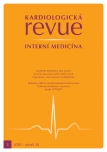Diabetes mellitus and cardiovascular disease
Authors:
J. Vítovec 1; J. Špinar 2; L. Špinarová 1
Authors‘ workplace:
I. interní kardioangiologická klinika LF MU a FN u sv. Anny v Brně 2 Interní kardiologická klinika LF MU a FN Brno
1
Published in:
Kardiol Rev Int Med 2018, 20(2): 118-122
Overview
SGLT2 inhibitors – gliflozins were introduced into clinical practice as oral antidiabetics, acting by increased glucose excretion by urine using the blockade of SGLT2 co-transporter, which leads to the blocking of glucose reabsorption in the kidneys. The first big clinical trial EMPA-REG OUTCOME has shown not only their effect on diabetes mellitus but also the effect of decreasing cardiovascular events, especially heart failure mortality and hospitalisations. The results also suggest that SGLT2 inhibitors have led to a decrease in body weight by 2–3 kg and to a decrease of systolic blood pressure by 3–5 mm Hg. The CANVAS trials presented in 2017 confirmed this beneficial effect on the decrease of hospitalization from heart failure and reduction of CV events. Real life data – obtained in the CVD REAL research on more than 300,000 patients from all over the world – confirm the positive results obtained in clinical trials.
Key words:
SGLT2 – diabetes mellitus – heart failure – dapagliflozin - empagliflozin
Sources
1. Khaw KT, Wareham N, Bingham S et al. Association of hemoglobin A1c with cardiovascular disease and mortality in adults: the European prospective investigation into cancer in Norfolk. Ann Intern Med 2004; 141(6): 413 – 420.
2. Vítovec J, Špinar J, Špinarová L. Empagliflozin a srdeční selhání. Hypertenze a kardiovaskulární prevence 2016; 5 : 19 – 23.
3. Ferrannini E, Muscelli E, Frascerra S et al. Metabolic response to sodium-glucose contransporter 2 inhibition in type 2 diabetic patients. J Clin Invest 2014; 124(2): 499 – 508. doi: 10.1172/ JCI72227.
4. Hummel CS, Lu C, Loo DD et al. Glucose transport by human renal Na+/ D-glucose cotransporters SGLT1 and SGLT2. Am J Physiol Cell Physiol 2011; 300(1): C14 – C21. doi: 10.1152/ ajpcell.00388.2010.
5. Seferović PM, Petrie MC, Filippatos GS et al. Type 2 diabetes mellitus and heart failure: a position statement from the HFA of the ESC. Eur J Heart Fail 2018; 20(5): 853 – 872. doi: 10.1002/ ejhf.1170.
6. Kvapil M. EMPA REG OUTCOME. Důkaz, že populace pacientů s diabetem se mění. Remedia 2016; 26 : 67 – 72.
7. McGill JB. The SGLT2 inhibitor empagliflozin for the treatment of type 2 diabetes mellitus: a bench to bedside review. Diabetes Ther 2014; 5(1): 43 – 63. doi: 10.1007/ s13300-014-0063-1.
8. Zinman B, Wanner CH, Lachin JM et al. The EMPA-REG OUTCOME Investigators. Empagliflozin, cardiovascular outcomes, and mortality in type 2 diabetes. N Engl J Med 2015; 373(22): 2117 – 2128. doi: 10.1056/ NEJMoa1504720.
9. Sattar N, Petrie MC, Zinman B et al. Novel diabetes drugs and the cardiovascular specialist. J Am Coll Cardiol 2017; 69(21): 2646 – 2656. doi: 10.1016/ j.jacc.2017.04.014.
10. Fioretto P, Giaccari A, Sesti G. Efficacy and safety of dapagliflozin, a sodium glucose cotransporter 2 (SGLT2) inhibitor, in diabetes mellitus. Cardiovasc Diabetol 2015; 14 : 142. doi: 10.1186/ s12933-015-0297-x.
11. Fioretto P, Stefansson BV, Johnsson EK et al. Dapagliflozin reduces albuminuria over 2 years in diabetic patients with renal impairment. J Am Soc Nephrol 2015; 26 : 1A. Abstr. TH-OR001.
12. Goto A, Arah OA, Goto M et al. Severe hypoglycaemia and cardiovascular disease: systematic review and meta-analysis with bias analysis. BMJ 2013; 347: f4533. doi: 10.1136/ bmj.f4533.
13. Weber MA, Mansfield TA, Alessi F et al. Effects of dapagliflozin on blood pressure in hypertensive diabetic patients on renin-angiotensin system blockade. Blood Press 2016; 25(2): 93 – 103. doi: 10.3109/ 08037051.2015.1116258.
14. Sonesson C, Johansson PA, Johnsson E et al. Cardiovascular effects of dapagliflozin in patients with type 2 diabetes and different risk categories: a meta-analysis. Cardiovasc Diabetol 2016; 15 : 37 – 49. doi: 10.1186/ s12933-016-0356-y.
15. Fabiánová J. Kardiovaskulární účinky dapagliflozinu u pacientů s diabetes mellitus 2. typu a různou úrovní rizika. Farmakoterapie 2016; 12 : 198 – 200.
16. Kosiborod M, Cavender MA, Fu AZ. The CVD-REAL Investigators and Study Group. Lower risk of heart failure and death in patients initiated on SGLT-2 inhibitors versus other glucose-lowering drugs. Circulation 2017; 136(3): 249 – 259. doi: 10.1161/ CIRCULATIONAHA.117.029190.
17. Neal B, Perkovic V, Mahaffey KV. The CANVAS Program Collaborative Group. Canagliflozin and cardiovascular and renal events in type 2 diabetes. N Engl J Med 2017; 377(7): 644 – 657. doi: 10.1056/ NEJMoa1611925.
18. Špinar J, Vítovec J, Špinarová L. SGLT2 – glifloziny – antidiabetika, antihypertenziva nebo léky na srdeční selhání. Kardiol Rev Int Med 2017; 19(3): 195 – 200.
Labels
Paediatric cardiology Internal medicine Cardiac surgery CardiologyArticle was published in
Cardiology Review

2018 Issue 2
-
All articles in this issue
- Arrhythmias in young adults
- Prevention of sudden cardiac death in patients up to 40 years of age
- Juvenile hypertension
- Chronic venous insufficiency and varicose veins in young people
- The significance and treatment of dyslipidaemia in young adults
- Diabetes mellitus and cardiovascular disease
- Možnosti ovlivnění inzulinové rezistence u jedinců s diabetem 1. typu
- Clinical study ODYSSEY OUTCOMES
- Oxygen therapy for suspected acute myocardial infarction – DETO2X-AMI
- Fixed dose combination of rosuvastatin and ezetimibe – drug profile
- Management of hypertensive patients with lower extremity peripheral arterial disease
- Cardiology Review
- Journal archive
- Current issue
- About the journal
Most read in this issue
- Arrhythmias in young adults
- Juvenile hypertension
- Fixed dose combination of rosuvastatin and ezetimibe – drug profile
- Chronic venous insufficiency and varicose veins in young people
